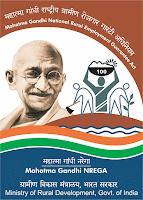Poverty
alleviation programmes in India 2017
The Government of India has a
variety of programmes to generate wage employment for the poor unskilled people
living in rural areas. Some of the programmes are as follows:
·
Jawahar
Gram Samridhi Yojana (JGSY)
·
National
Old Age Pension Scheme (NOAPS)
·
National
Family Benefit Scheme (NFBS)
·
National
Maternity Benefit Scheme.
·
Annapurna.
·
Integrated
Rural Development Program(IRDP)
·
Pradhan
Mantri Gramin Awaas Yojana.
·
National
Rural Employment Guarantee Act (NREGA)
These days one of the
most important and discussed programme in India is Mahatma Gandhi national
Rural Employment Guarantee Act (MGNREGA). I would like to highlight few things
about that programme:
Mahatma Gandhi
National Rural Employment Guarantee Act (MGNREGA)
National
Rural Employment Guarantee Act 2005 (or, NREGA No 42, later renamed
as the "Mahatma Gandhi National Rural Employment Guarantee Act",
MGNREGA), is an Indian labour law and social security measure that aims to
guarantee the 'right to work'.
Finance
Minister Arun Jaitley allocated highest ever funds to rural job scheme MGNRGEA
Rs 48,000 crore rupees in 2017-2018 budget. Giving a major thrust to rural
India in the Union Budget, the government
announced bringing one crore households out of poverty and making 50,000
gram panchayats poverty free by 2019, besides allocating highest ever funds to
rural job scheme MGNRGEA (http://www.nrega.nic.in/netnrega/home.aspx
Stating
that improving the life of people in rural areas is "a non-negotiable
agenda for the government", Finance Minister Arun Jaitley said the
government would start a Mission Antyodaya (Poverty Free India by 2022) for poverty
alleviation in the country.
"With
a clear focus on improving accountability, outcomes and convergence, we will
undertake a Mission Antyodaya to bring one crore households out of poverty and
to make 50,000 gram panchayats poverty free by 2019, the 150th birth
anniversary of (Mahatma) Gandhiji," Jaitley said in his speech.
Allocating
higher funds to all the major schemes for rural areas, he said, "The
budget provision of Rs 38,500 crore under Mahatma Gandhi National Rural
Employment Guarantee Act (MGNREGA) in 2016-17 has been increased to Rs 48,000
crore in 2017-18."
Besides
providing employment, MGNREGA should create productive assets to improve farm
productivity and incomes, he said, adding that this is the highest ever
allocation for MGNREGA.
Exuding
confidence that the construction of roads under Pradhan Mantri Gram Sadak
Yojana (PMGSY) has increased to 133 km per day, he said the government will
connect 65,000 eligible habitations by constructing 2.23 lakh km of roads in
rural areas by 2019. But, the budget allocation for the scheme remains constant
at Rs 19,000 crore.
Whereas,
the allocation of another flagship scheme Pradhan Mantri Gram Aawaas Yojana
(gramin) has been increased to Rs 23,000 crore from Rs 15,000 crore.
Similarly,
the allocation for National Rural Livelihood Mission for promotion of skill
development has also been increased to Rs 4,500 crore in 2017-18.
In a
bid to ensure safe drinking water to over 28,000 arsenic and fluoride affected
habitations in the next four years, the government will start a sub-mission of
the National Rural Drinking Water Programme.
In
this year's budget, the allocation for the Rural Development Ministry has also
been increased by more than 10 per cent to Rs 1,07,758 crore from Rs 97,760
crore.
For
imparting new skills to the people in the rural areas, Jaitley said that masonry
training will be provided to 5 lakh persons by 2022, with an immediate target
of training at least 20,000 persons by 2017-18.
The
Ministry also mentioned that Swachh Bharat Mission (Gramin) has made tremendous
progress in promoting safe sanitation and ending open defecation.
Sanitation
coverage in rural India has gone up from 42 per cent in October 2014 to about
60 per cent. Open Defecation Free villages are now being given priority for
piped water supply, he added.
Speaking
on the budget, Rural Development Minister Narendra Singh Tomar said it will be
a "game changer" for rural India and will transform Indian villages
to become base of the country's growth in coming years.
